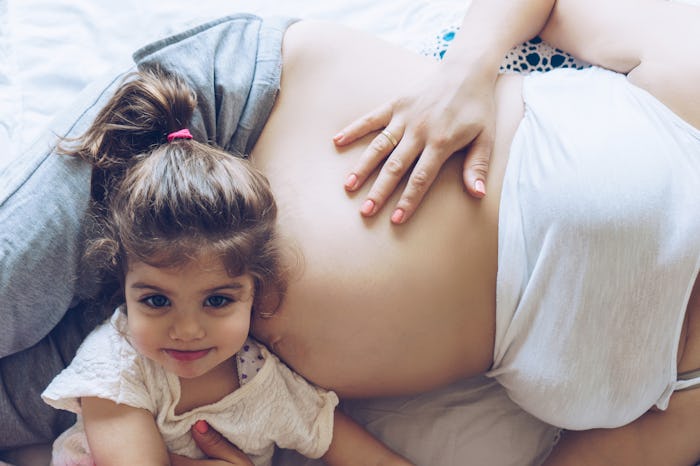For many parents, deciding when to get pregnant again can be tough. While you may want your kids to be closer in age, years of diapers and conflicting nap schedules are less desirable. On top of these concerns, there are health risks associated with having children too closely together. But how long should women wait between pregnancies exactly? New research contradicts past advice that pointed to 18 months as the minimum timeframe between babies.
For years, the World Health Organization (WHO) has advised women to let 18 to 24 months lapse between pregnancies. But a new study, published in the journal JAMA Internal Medicine, found that 12 to 18 months between pregnancies is enough time to reduce health risks, according to CaféMom. Researchers from the University of British Columbia and the Harvard TH Chan School of Public Health looked at roughly 150,000 births to Canadian mothers, according to the BBC, and their findings determined that conceiving less than 12 months after delivery — not 18 — is associated with risks for all women, regardless of age. But the exact risk differed depending on age.
When women over the age of 35 got pregnant so soon after giving birth, they experienced health risks themselves, including an increased risk of maternal mortality, as CNN reported. That risk was around 1.2 percent for pregnancies less than a year apart, but dropped to only 0.5 percent if 18 months elapsed. But for women between 20 and 34 years of age, the risk was in terms of premature labor. With less than 12 months between pregnancy, the risk of preterm labor was 8.5 percent, but dropped to 3.7 percent after 18 months.
In the past, WHO advised waiting longer between pregnancies to lower these risks. The Mayo Clinic lists premature birth, placental abruption, low birth weight, congenital disorders, and schizophrenia as being associated with pregnancies within six months of a previous delivery. And while the authors of the study don't discredit these associations, they do suggest a shorter ideal interval between pregnancies than the previous minimum of 18 months, as CaféMom reported.
These findings are good news for anyone looking to have children with siblings closer in age, but they may benefit one demographic in particular. "The finding may be reassuring particularly for older women who must weigh the competing risks of increasing maternal age" the authors of the study wrote, according to CNN.
It is still unclear why close pregnancies come with increased risk. But, according to March of Dimes, it could be because a mother's body needs time to recover in a few different ways. For one thing, pregnancy depletes nutrients, like folic acid, from the body. Lack of these vitamins and nutrients in a mother's body could put their baby at risk. Additionally, March of Dimes reported that women's bodies often need time to heal from infection and inflammation that can occur during pregnancy, or to reset the birth canal's microbiome. The microorganisms that live in the vagina could impact your risk of premature delivery, and it takes time for everything to get back to normal down there after having a baby. Perhaps future research into pregnancy timing will make the why a bit clearer.
When my husband and I were planning our family, my mom gave me an important insight: there is no perfect time to have a baby. Raising a child is hard and life will always be going on around you. Whether you went for the big three under three, or spaced your children out to give yourself a bit of a break, parenting is just plain hard. But studies such as these are an important part of helping women to fully understand the impact of their choices, and help them to plan accordingly.
